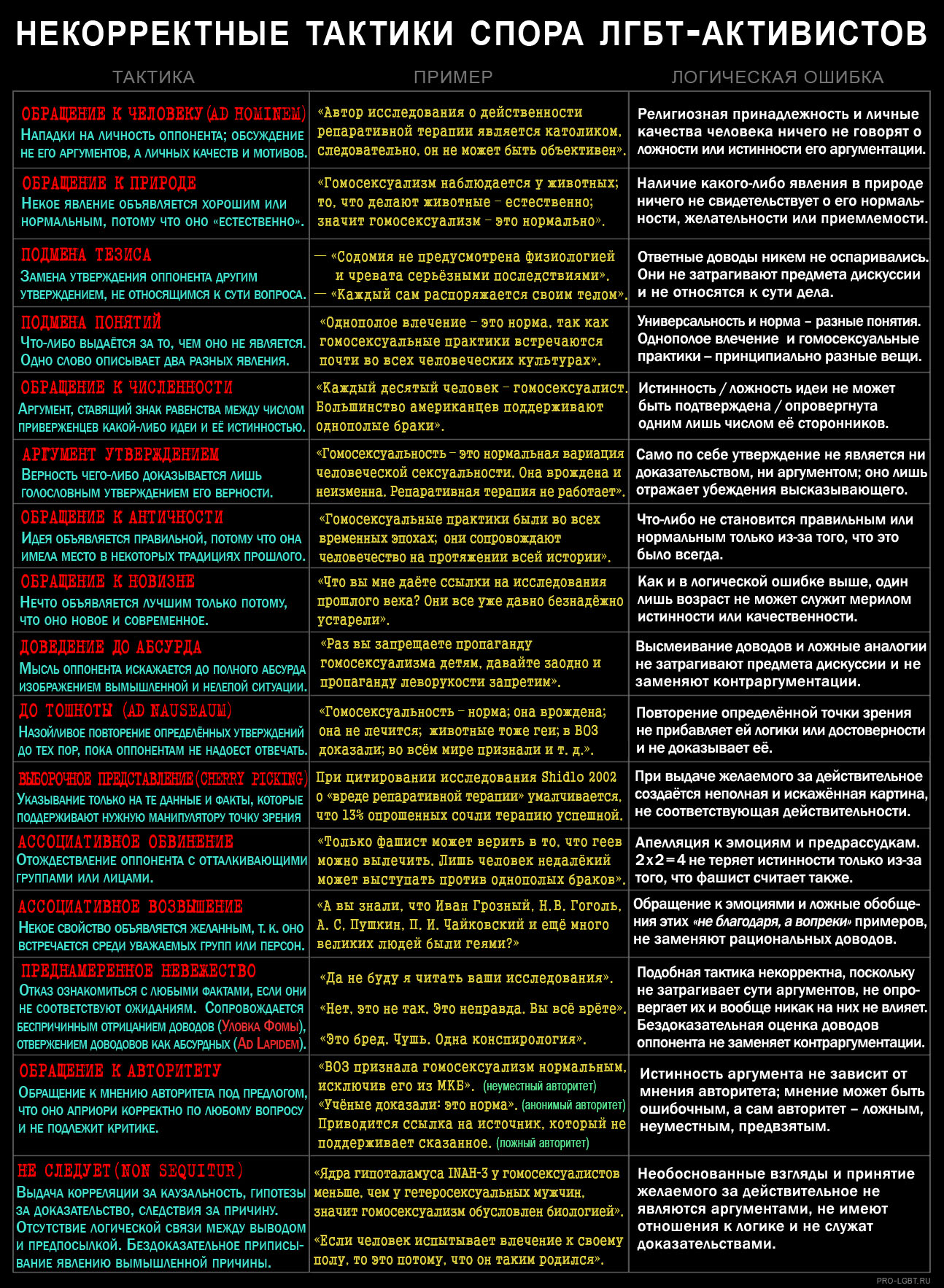The political rhetoric of LGBT activists is built on three baseless postulates that affirm the “normality”, “congenitality” and “invariability” of homosexual attraction. Despite generous funding and numerous studies, this concept has not received scientific justification. Accumulated volume scientific evidence rather indicates the opposite: homosexuality is acquired deviation from the normal state or development process, which, given the client’s motivation and determination, lends itself to effective psychotherapeutic correction.
Since the entire LGBT ideology is built on false grounds, it is impossible to prove it in an honest logical way. Therefore, in order to defend their ideology, LGBT activists are forced to turn to emotional idle talk, demagogy, myths, sophisms and knowingly false statements, in a word - rabulistic. Their goal in the debate is not finding the truth, but victory (or its appearance) in the dispute by any means. Some representatives of the LGBT community have already criticized such a short-sighted strategy, warning activists that one day it will return to them as a boomerang, and urged to stop the spread of anti-scientific myths, but in vain.
Next, we will consider the most common logical tricks, tricks, and sophisms, which are used by advocates of LGBT ideology.
AD HOMINEM
SUBSTITUTION OF THE THESIS
Deliberate ignorance
APPEAL TO EMOTIONS
ARGUMENT APPROVED
APPEAL TO NATURE
SELECTED FACTS
SUBSTITUTION OF CONCEPTS
APPEAL TO NUMBER
TALKING TO NONSENSE
APPEAL TO AUTHORITY
APPEAL TO ANTIQUITY
AD NAUSEAM
GATE MOVEMENT
AD HOMINEM (appeal to a person)
Unable to refute the argument itself, the demagogue attacks the person nominating him: his personality, character, appearance, motives, competence, etc. The essence is in an attempt to discredit a person, presenting him to the public as unworthy of trust. Often combined with the tactics "source poisoning»(Poisoning The Well), where the demagogue before the discussion strikes a preemptive strike in the style of Ad Hominem, trying to denigrate the source. Example: “The journal in which the study is published has low citation rates; this is a “predator magazine” of the “Murzilka” level ». Such attacks have nothing to do with the quality and truth of the arguments themselves. This is an attempt to divert attention from the facts, overshadowing the logic with negative emotions and creating the prerequisites for biased conclusions. Of course, the creation of negative impressions of the source does not mean that the arguments themselves have already been refuted.
There are three main categories to Ad Hominem tactics:
1) Ad personam (transition to personalities) - a direct attack on the personal characteristics of the opponent, usually with insults or demeaning unproven statements. Someone correctly noted that the weaker the logic, the stronger the expression. Example: “This therapist is a hypocrite, a scoundrel, a charlatan, and his diploma is fake.”. It must be remembered that the personal qualities of a person, even the most disgusting, do not make his arguments erroneous.
2) Ad hominem circumstantiae (personal circumstances) - An indication of the circumstances that supposedly dictate a certain position to the opponent, which implies his bias and dishonesty. For example: "This scientist is a Catholic believer." Such an argument is also erroneous, because the fact that the opponent is for some reason inclined to put forward precisely this argument does not make the argument itself from a logical point of view less fair.
3) Ad hominem tu quoque (such himself) - an indication that the opponent himself is not without sin. Example: “Many heterosexuals have anal sex themselves.” Again, such an argument is inherently erroneous, because it does not refute the argument and does not make it less true in terms of logic. The truth or falsity of a statement has nothing to do with what the person pushing it does. The fact that anal sex, so to speak, is practiced by some heterosexuals does not negate detrimental effects this perverse action and does not equalize it with natural sexual intercourse.

SUBSTITUTION OF THE THESIS (ignoratio elenchi)
A logical error and a demagogic technique, which consists in the fact that, faced with a certain strong statement and realizing that his affairs are bad, the demagogue in his answer goes on to discuss another statement, at least true and similar to the original, but not related to the essence of the question. The arguments supporting the original conclusion are removed from the argument and arguments for something else are offered instead. The thesis, which at the same time turns out to be confirmed, has nothing to do with the original thesis. This tactic can be used both in proof and in refutation. For instance:
Thesis: "The legalization of same-sex marriage in Russia is undemocratic, as it contradicts the majority opinion. ”
The answer with the substitution of the thesis: "A democratic society cannot discriminate against homosexuals; they should have rights like everyone else, including the right to marry. ”
This remark cunningly contains the words “democracy” and “marriage”, which gives the layman the impression that the arguments of the initial thesis receive an exhaustive answer. He does not even notice that the manipulator completely ignored the basic proposition of undemocracy and responds with irrelevant statements, which were not disputed by anyone. Yes, homosexuals cannot be discriminated against; yes, they are entitled to all the rights that the others have - there is no dispute about this, especially since in Russia homosexuals already have all the rights that the rest do, since there is not a single law discriminating against citizens on the basis of their sexual preferences. Therefore, speaking of “marital equality”, LGBT activists resort to substitution of conceptsgiving out “The requirement to change the legal definition of marriage bypassing the democratic process” behind “The right to marry” - two fundamentally different things. Especially since marriage — this is not a right, but a certain cultural tradition. The practical issues - property, inheritance, guardianship - are fully regulated by notary.
Another example. Question: “Is it possible to allow homosexuals to work with children, given the disproportionately high rates of pedophilia among them?"
The indignant answer with the substitution of the thesis: “Excuse me, but most cases of molestation are committed by heterosexuals!”
As this often happens, an inexperienced person will begin to defend himself, and the demagogue will further lead him away from the original thesis, discreetly translating the discussion into a plane convenient for him. The way out of this situation is actually simple: you need to immediately point out the thesis substitution and poke the demagogue with your nose into the initial question. Do as many times as needed. A replica could be like this: “You gave an excellent answer to the question“ What is the orientation of the majority of molesters? ”, However, this is not what I asked, let's return to discussing my question. Heterosexual pedophilia occurs 2 times more often than homosexual, although the number of heterosexual men exceeds the number of homosexual men by about 35 times. Thus, in percentage terms, pedophiles among homosexuals about xnumx times bigger and that's — according to APA. Is it reasonable for such statistics to allow homosexuals to work with children? ”
A sophism similar in principle to the action, not affecting the subject of discussion and not relevant, is known as “Petty nitpicking". Example: “You indicated the 615 page as the source of the quote, but it is on a completely different page”. It is impossible to dispute the thesis on the basis of insignificant and secondary arguments, avoiding the answer to the main question, which, in fact, is the essence of the matter. Even if the nit-picking is fair, their fallacy is that they are not good enough to refute the allegation.
Deliberate ignorance (willful ignorance)
It consists in ignoring any arguments that are not consistent with the internal model of reality. Unlike ordinary ignorance, a person is aware of facts and sources, but refuses to recognize them, or even become familiar with them if they do not meet his expectations. Such a person will usually come up with pretexts in the style of Ad Hominem and resort to tactics Ad lapidem (lat. "appeal to the stone"), which consists in rejecting the opponent’s arguments as absurd without giving any evidence of their absurdity (this is nonsense, conspiracy theology, you are lying, etc.). Ad Lapidem's statements are false because they do not affect the essence of the arguments and do not affect them in any way. This is sophism "arbitrary names" and "unsubstantiated assessments”, Where the unfounded denunciation of the opponent’s arguments by unflattering epithets replaces the arguments.

Denial of facts can be either intentional tactics or cognitive biases, known as “confirmation bias"And the unconscious defense mechanism"negation". The most convincing arguments will be pushed by the psyche of the individual in the same way as a cork is pushed out by water.
В a book two Harvard gay activists offering homosexual propaganda strategies described 10 major problems homosexual behavior that should be eliminated for the full success of the gay agenda. Among these problems are denial of reality, nonsense thinking and mythomania.

«Anyone, gay or straight, can resort to fantasy from time to time and believe in what they want rather than in reality. However, gay men in general are more prone to this than straight people because they have to experience more fear, anger and pain. Therefore, denial of reality is a characteristic homosexual behavior ... This can manifest itself as:
• Wishful thinking - a person believes that he is pleased, and not that the truth.
• Inconsistencyb - so widespread that it requires neither an example nor an explanation. We all argued in which our homosexual interlocutor argued that was not related either to our logic or to his own. Why? Because given the rules of logic, you have to draw conclusions that you do not like. Therefore, gays often deny logic.
• Increased emotionality - One of the effective methods of eliminating the truth is the use of wild and overly emotional rhetoric. Gays resorting to this method hope to shout out facts and logic with irrelevant expressions of personal passions.
• Unfounded views “Instead of logically analyzing the facts, studying the problem and finding a suitable solution, many gays flee from reality to Netland and take energetic efforts to refute the facts and logic.” (Kirk and Madsen, After The Ball 1989, p.339)
APPEAL TO EMOTIONS
It is a tactic trying to influence a person’s beliefs through influencing emotions: fear, envy, hatred, aversion, pride, etc. One of the often used by LGBT propagandists of emotional tricks is known as "Appeal to mercy"(Argumentum ad misericordiam). Having no factual evidence to substantiate his position, the demagogue seeks to evoke pity and sympathy in the listener in order to obtain concessions from the opponent. For instance: “Homosexuals are victims of discrimination and evil rock. It’s not their fault that they were born that way. They already suffered too much, so we need to give them everything that they require. ” Such arguments are incorrect and erroneous, since they do not touch on the essence of the matter and lead away from a sober assessment of the situation, referring to the prejudices of the listener, who is invited to agree with what was said not because of convincing arguments, but out of a feeling of compassion, shame or fear of appearing inhuman, backward, uncultured and etc.
Another emotion-trick is “Associative charge"(Guilt by association), which claims that something is unacceptable because it was practiced by a group or person with a bad reputation. The demagogue resorting to such tactics identifies the opponent with the textbook villains and unattractive groups who have expressed a more or less similar thesis. For example, a person expressing any criticism regarding LGBT people is likely to be equated with Hitler or the Nazis. The developers of homosexual propaganda tactics directly prescribed the identification of opponents with groups and individuals "Whose secondary traits and beliefs disgust the average American": Ku Klux Klan, fanatical southern preachers, menacing bandits, prisoners and, of course, Hitler (Reductio ad hitlerum).
Since the majority considers Hitler's values to be unacceptable, the use of such a comparison can lead to an emotional reaction that overshadows rational judgment.

Variations of the Reductio ad Hitlerum trick include comparing the opponent’s ideas with the Holocaust, the Gestapo, fascism, totalitarianism, etc.

Putting aside emotions, it should be understood that if a person is really “bad” in some ways, this does not mean at all that everything that he says, supports or represents, a priori is bad and incorrect. We must not refuse the truth of the fact that two, two, four, only because Hitler believed the same.
Many Internet networks have a rule known as the “Godwin Law”, according to which the discussion is considered completed as soon as the comparison with Hitler or Nazism takes place, and the party who made this comparison is considered to be the loser.
The diametrically opposite side of the associative error described above is “Associative elevation"(Honor by association). The demagogue argues that something is desirable because it is a property of a respected group or person. So, LGBT propagandists constantly refer to various celebrities who allegedly had homosexual inclinations, although in reality such examples are either sucked from a well-known finger or belong to the category “not thanks, but contrary to”. Gay propaganda developers explain it this way:
“... we must compensate for the prevailing negative stereotype of homosexual women and men, presenting them as the main pillars of society ... Famous historical figures are especially useful for us, as they invariably dead, like a nail, and therefore cannot deny anything or sue for defamation... By aiming its blue spotlight at such revered heroes, a skillful media campaign can, in no time at all, make the gay community look like a true godfather of Western civilization. " (Kirk and Madsen, After The Ball 1989, p.187)

When a person gives several examples of the fact that such and such persons possess a well-known attribute and without further reasoning and evidence concludes that all such persons possess this attribute, he makes the mistake "false generalization"(Dicto simpliciter).
ARGUMENT APPROVED (argument by assertion)
This is a logical mistake that occurs when the fidelity of something is proved only by the assertion of its fidelity, without providing convincing data or arguments in its favor. The statement itself is neither evidence nor argument; it only reflects the convictions of the person expressing it. Example: “Homosexuality is innate and untreatable. When answering the question about the possibility of changing sexual orientation, the American Psychiatric Association answered with a definite “no” ”.
The allegations are often combined with tactics called "Gallop Guiche" (Gish Gallop), which is a barrage of irrelevant, inaccurate and knowingly false statements, the refutation of which the opponent will need a lot of time. This tactic is constantly used on television talk shows, where the response time is limited. Having thrown out a bag of false statements, the demagogue leaves his opponent with an impossible task - to explain to the public why each of them is untrue. For an audience with limited knowledge, Gallop Guiche looks very impressive. On the one hand, if the opponent starts to analyze all the arguments of the demagogue, the public will quickly begin to yawn and find him a tedious bore; on the other hand, if any arguments are left without refutation, it will be perceived as a defeat.
To tell a deliberate lie is much easier than to refute it. A demagogue who seeks not truth but victory is not constrained by anything and can say anything, while truth requires precise formulations and detailed logical justification within the strict framework of objective factology. As Jonanat Swift observed: “The lie flies, and the truth lame after it; so when the deception is revealed, it is too late ...»
Thus, in order to trumpet the rumors about “homosexual animals”, LGBT propagandists needed 40 seconds to refute, which took video in 40 minutes.
APPEAL TO NATURE (appeal to nature)
This is a logical mistake or rhetorical tactic in which a certain phenomenon is declared good because it is “natural” or bad because it is “unnatural”. Such a statement is usually opinion, and not a fact that, in addition, is erroneous, irrelevant, impractical and contains extremely vague definitions. The meaning of the word “natural”, for example, ranges from the meaning “normal” to “occurring in nature”.
However, natural data provide quite reliable value judgments, the appeal to which is correct from the point of view of logic. Therefore, the statement “Sodomy is unnatural” not a mistake. Penetration into the lower part of the gastrointestinal tract, which by nature is not adapted to penetration and friction, is contrary to the natural data of human physiology and is fraught various injuries and dysfunctions, often irreversible. It is a fact.
As an example of an erroneous appeal to nature, one of the key syllogisms of homosexual propaganda can be cited: “Homosexuality is observed among animals; what animals do is natural; that means homosexuality is natural for man. ” In addition to an incorrect reference to nature, this conclusion contains two more logical errors:
1) «Substitution of concepts”, Manifested in a biased anthropomorphic interpretation of animal behavior and an attempt to pass off“ natural deviation from the norm ”as a“ natural norm ”.
2) «Selective presentation of facts", Expressed in a highly selective extrapolation of the phenomena of the animal world on human life.
In the comedy of Aristophanes “Clouds”, the absurdity of such an approach is shown: trying to prove to the father the legality of beating his parents with his children, the son gives an example of roosters, to which his father replies that if he wants to take an example from roosters, then let him take everything.

In any case, the presence of any phenomenon in nature does not testify to its normality, desirability or acceptability. Cancer, for example, is an absolutely natural phenomenon - what conclusion can be drawn from this information? Yes, no.
SELECTED FACTS (cherry picking)
A logical mistake consisting in pointing only to the data and facts that support the point of view needed by the manipulator, while ignoring all other relevant data that does not support it. So, turning to confirm the normality of animal behavior, LGBT activists ignored all the atrocities and ugliness inherent in him and focused only on his same-sex manifestations, while closing their eyes to their compulsion and fleetingness.
Similarly, referring to genetic research, propagandists cite only out of context quotes that support the hypothesis “Genetic contribution to the development of sexual orientation”while ignoring the reservation emphasized by the researchers that “This contribution is far from being decisive”.

Sometimes “cherry picking” reaches such extremes that the manipulator almost halfway breaks the quoted sentence, completely distorting its message. For example, APA in the Lawrence v. Texas lawsuit, which led to the repeal of sodomy laws in 14 US states, cited the following dictum Freud:
“Homosexuality is undoubtedly not an advantage, but neither a reason for shame, nor a vice or degradation. It cannot be classified as a disease. We believe that this is a variation of sexual function ... "
Not getting ready to end the proposal, APA kept silent that, according to Freud, this “variation in sexual function is caused by a certain stunted sexual development» — that is, represents pathology.
CHANGE OF CONCEPTS (equivocation)
It consists in using the same word to describe two different phenomena, or in pretending to be something that it is not, which leads to a false conclusion. For example, WHO provides a very precise definition of homosexuality: "An exclusive or predominant sexual desire for persons of the same sex, with or without physical connection." But gay propagandists, speaking of animals, call “homosexuality” any interactions between animals of the same sex, even if they are completely devoid of sexual motivation. Thus, female gulls, which, when there are not enough males, form pairs to care for the offspring, are included in the statistics of “450 species of“ homosexual ”animals”, despite the fact that they mate exclusively with males. In reality, there is not a single animal that would meet the definition of WHO, since no individual in nature shows "Exclusive or predominant sex drive»To individuals of their gender, especially without a physical connection.

Another example of the substitution of concepts is observed in the interpretation research Evelyn Hooker, who is presented by APA as “scientific” evidence of the “normality” of homosexuality (although this study did not pursue such a goal). Based on a sample of 30 (!) People, Hooker concluded that “Some homosexuals can represent completely superior, top-level people. ”. Thus, the “Adequate social functioning” Some homosexuals pretend to be "normality" all homosexuals (false generalization), despite the fact that the ability to perform social functions does not at all preclude the presence of psychopathology.
Moreover, the stating about the "normality" of homosexuality, the APA refers to works that demonstrate its prevalence (Bullough 1976; Ford & Beach 1951; Kinsey 1948 and 1953), thus replacing "prevalence" In short "normality", although the prevalence or universality of the phenomenon in no way indicates its normality. In addition to the substitution of concepts, the false argument "Appeal to the number».
APPEAL TO NUMBER (argumentum ad numeram)
Given argument mistakenly equates the number of adherents of an idea and its truth. So, Kinsey study (recognized falsification in the 2006 year) showed that 48% of the men in his sample (which consisted mainly of marginals) had at least one homosexual contact in their life, which became the basis for the propagandists about the normality of such contacts. However, the phenomena and ideas that are widely supported are not necessarily true.
A subspecies of this error is “Appeal to the majority"(Argumentum ad populum). Instead of rational reasoning, the demagogue turns to public opinion. Example: “Most Americans support gay marriage.”. Despite the fact that the majority may indeed be right, his opinion is not safe from errors. The truth / falsity of the statement cannot be confirmed / refuted by the mere number of its supporters. For example, in history there were periods when the absolute majority considered the Earth flat, but this does not mean that the Earth is really flat. The majority opinion indicates only the popularity of the idea, and not its truth or adequacy, although often it is popularity that is crucial in decision-making.
Bringing to Absurdity (ab absurdo)
Being unable to object essentially, the manipulator develops the opponent’s thought to the point of absurdity, presenting a fictitious and absurd situation, and on this basis tries to discredit the original thought. Example: “Since you forbid the propaganda of homosexuality to children, let’s then we will prohibit the propaganda of left-handedness. ” Such tactics have no evidentiary power and are designed only for the opponent's polemical inexperience. It is usually accompanied by the following logical errors:
• “False analogy"- a comparison in which the number of similar features in the compared objects tends to zero, while completely ignoring the fundamental differences: “Treating homosexuals is like treating redheads”
• “False dichotomy"- a mistake consisting in" black and white "perception, ignoring all possibilities, except for two extremes: “Who does not support gays is homophobic. Either you are for gays or against them. ”. Moreover, the third possibility (or a greater number of possibilities) is not allowed, although a person, for example, may not be against “gays” and their perverted sexuality, but against an aggressively promoted LGBT ideology, which is unacceptable, including for many homosexuals.
• Non sequitur (lat. “should not be”) - an error that occurs when an unreasonable conclusion is derived from a certain statement, which logically does not follow from it. Example:

This error also occurs when a far-fetched reason is attributed to any phenomenon without proof that it exists. Example: “Some people are homosexual because they were born that way.”. This also includes self-seduction so dear to the propaganda heart as issue of correlation for causality, hypotheses for proof и investigation for the cause.
APPEAL TO AUTHORITY (argumentum ad verecundiam)
In this case, instead of providing evidence, it is suggested to consider any statement correct (or false) because some source considered authoritative considers it correct (or false). The very statement that a certain opinion of an authority is correct does not contain a logical error. However, such an error occurs if one tries to argue that an authoritative opinion is always fundamentally correct and, therefore, should not be criticized. The opinion of authoritative sources is not always true; they too can be mistaken or deliberately obscure. An error when referring to the opinion of an authority occurs when:
1) the topic does not belong to his competence;
2) authority is biased towards the topic;
3) there is evidence that authority is wrong.
You can often hear an appeal to anonymous authority: "Scientists have proven ... Psychiatrists believe ... There is a consensus in the scientific community ..." The names of scientists and psychiatrists are not attached, and it is not possible to verify the information. Thus, if the opponent’s argument begins with similar phrases, then it can be expected that unfounded and unverifiable arguments will follow.
A kind of appeal to authority is Ipse dixit (lat. "he said"). The decisive argument is justified only by the unfounded statement of one person, often of himself: "As a psychologist and therapist, I can say that homosexuality is an absolute norm."
To give weight to groundless statements, the manipulator often accompanies them with links to various sources. However, a detailed examination of the sources usually reveals that they not only do not support his arguments, but directly contradict them. For example, research same-sex couples in dark-albatross, which is presented as an argument in favor of homosexuality, not only does not show the presence of same-sex attraction in these birds, but also indicates the disadvantage of same-sex couples, manifested in underestimated by more than half the rates of hatching of chicks and reproductive success, compared with normal in pairs.
Similarly under a famous propaganda video with pyromaniac The title is a document whose 5 pages are filled with, among other things, links to various studies with pretentious headings. An impressive number of links are given there only to create the illusion of reliability and solidity, on the basis of the correct calculation that no one from the target audience will check them. However, after reading the data from these studies, the inquisitive reader will be able to see firsthand that they do not support the claims made in the video.

The most frequent incorrect appeal to authority by advocates of normative homosexual relations is undoubtedly a reference to the WHO decision in 1990 to exclude the diagnosis of “homosexuality” as such from its classification of diseases. Moreover, the argument often takes the form of "vicious circle"(Circulus vitiosus), when the thesis is justified by the statement arising from it: “WHO has excluded homosexuality from the ICD because it is the norm. Homosexuality is the norm because the WHO has expelled her from the ICD. ” Of course, these two statements are not presented sequentially, but are separated by a certain volume of verbiage.
Since WHO is just a coordinating bureaucratic institution under the UN, which is guided not by scientific knowledge, but by conventions achieved by show of hands, any references to its literature to justify controversial positions are simply meaningless. This is an appeal to false or inappropriate authority.
WHO does not pretend to be scientific objectivity in preface to the classification of mental disorders in the ICD-10 openly notes that:
"Present descriptions and instructions don't carry in itself theoretical meaning and do not pretend to a comprehensive definition of the current state of knowledge of mental disorders. They are simply symptom groups and comments about which a large number of advisors and consultants in many countries of the world deal as an acceptable basis for defining category boundaries in the classification of mental disorders. ”
APPEAL TO ANTIQUITY (argumentum ad antiquitatem)
It is a kind of logically erroneous argumentation in which a certain idea is considered correct on the basis that it occurs in some traditions of the past. So, apologists for homosexual relationships eagerly grab hold of any references to same-sex practices in historical sources, although the fragments that have survived to this day are very vague and ambiguous, and what is described in them is hardly comparable to what is happening today in the LGBT community. It is to such a logically defective argument that APA resorts, referring to the book “Sexual variance in society and history”(Bullough 1976) as evidence of the“ normality ”of homosexuality. The argument here takes the form “That's right because it was always". One can recall the many disgusting phenomena that have accompanied humanity throughout its history, but it would not occur to any sensible person to call them therefore “correct”.
Another example of a logical error in which the age of an idea serves as a measure of its truthfulness is “Appeal to novelty”(Argumentum ad novitatem), according to which the newer, the more correct. So, any research conducted before the year 1948 will be swept aside by polemic sodomites as "outdated", but this, of course, only if the conclusions of the research are inconvenient for them. If the conclusions are in their hands, then the study of Kinsey from 1906, and the book of Wilhelm Fliess from XNUMX, which mentions the hypothesis of "innate bisexuality" (albeit anatomical), are quite relevant. This phenomenon is known as "Double standards", Whose essence is aptly noticed by a commentator in VK:

AD NAUSEAM (to nausea)
“The main thing is to talk about homosexuality until it becomes completely tiring” - Directly prescribed by the developers of gay propaganda. This tactic provokes excessive discussion in order to avoid discussion of topics inconvenient for the manipulator. It consists in the intrusive repetition of certain statements until the exhausted opponents give up on a futile undertaking to make friends with the stubborn debater with common sense. It’s hard to motivate yourself to refute again and again the standard set obscurantist dogmas that with adherent persistence scatter the adherents of sodomy, wherever there is an opportunity: “Homosexuality is the norm; she is congenital; it is not treated; animals are gay too; in WHO proved; recognized throughout the world, and so on. "

Effect produced argumentum ad nauseam, such that it is enough to simply repeat the statement again and again, without any argument or evidence. In the end, some of the opponents taken by starvation will not survive and surrender, but from the outside it will look as if they no longer have objections. Here you can recall Goethe's dictum: "Our opponents refute us in their own way: they repeat their opinion and do not pay attention to ours. ” Naturally, the repetition of a certain point of view does not add logic to it and does not prove it.
GATE MOVEMENT (moving goalposts)
This trick, which consists in arbitrarily changing the criterion that determines the validity of an argument, is usually resorted to by the losing side in a desperate attempt to save face. Example:
“Show me at least one gay person who would benefit from reparative therapy.”
- Please, here is the video evidence Christopher Doyle David Pickup, and more tens others.
- Not. These are not real gays. (trick fake scotsman). Their change is not real and in general, it is unscientific evidence. You authoritative sources show.
— Please non-fiction with APA website: 27% of homosexuals and 50% of bisexuals became completely heterosexual as a result of psychoanalytic therapy.
- Not. This is an outdated study.
- Here 2008 study of the year...
This is followed by statements in the style of Ad hominem, Ad lapidem, etc.

When not one argument, but several is presented to prove a thesis, the manipulator often resorts to tactics "Incomplete refutation"... He attacks one, two of the most vulnerable arguments, leaving the most essential and only important without attention, and at the same time pretending to refute the whole thesis to smithereens. This brings to mind the internet axiom known as Danth's Law:If someone claims to have won a debate on the Internet, then usually it's just the opposite».
There are many more sophisms, rhetorical tricks and psychological techniques, but we will focus on the disassembled. It should be remembered that the use of such incorrect methods does not affect the truth of the arguments, does not make them less fair from the point of view of logic, but only once again emphasizes the incompetence of the critic and the lack of adequate counterargument in fact.
Of course, the errors described above can also be found in the arguments of those who oppose the propaganda of LGBT ideology, but they also have true arguments, while LGBT propagandists have no such arguments, and they cannot be (because of “error fundamentalis"). Consciously or not, they act in accordance with the prescription indicated in the aforementioned “the alphabet of gay movement":
“Our effect is achieved without resorting to facts, logic and evidence ... The more we distract the homophobe with irrelevant or even deceptive superficial arguments, the less he will be aware of the real nature of what is happening, which is only for the best.” (Kirk and Madsen, After The Ball 1989, p.153)
The most common tactics used by LGBT demagogues are summarized in the table below. If your opponent uses any of this table in a dispute, indicate to him that he is using incorrect dispute methods that prevent the establishment of truth, and ask him to return to the right line of conversation or dispute. If the opponent continues to respond with the contents of the table, then further continuation of the conversation with him does not make sense. As one classic said: “If you argue with a fool, then there are already two fools”. You can count the drain.


Thank. Very interesting. I use materials from your site in disputes with fans of sodomy.
Thank you. Very valuable information.
I sent my wife to read it too.
Good article. It came in handy for me to understand how to respond to the official appeals that began to arrive with a request to block a draft submitted to the State Duma of the Russian Federation, which would ban LGBT propaganda. This article will allow you to correctly answer the applicant, without sending him directly.
Cool material for polemics with pro-LGBTQ people! Thanks for the work, just what I needed!